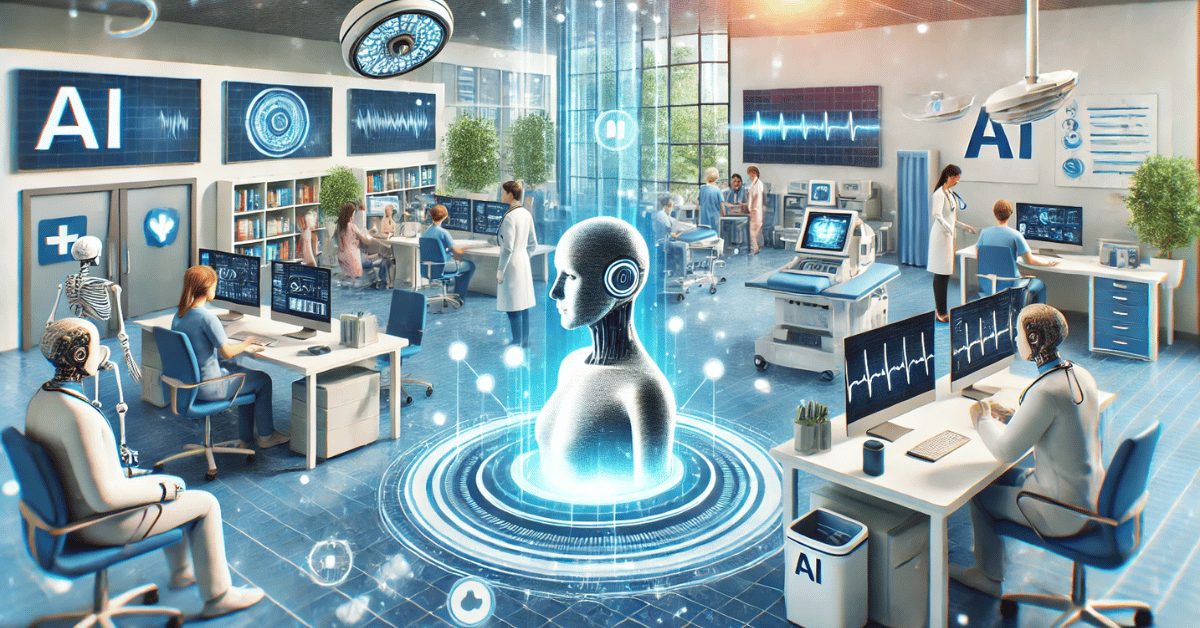The healthcare industry is experiencing an era of digitalization, and AI agents are driving the way. Intelligent systems are changing how the healthcare system is run and how operations are conducted. A study by Accenture suggests that AI applications in healthcare will likely produce around $150 billion of savings for the sector in 2026. From automating the administrative process to delivering instant diagnostic assistance, AI agents for healthcare are proven to be powerful instruments to improve operational and clinical efficiency.
Looking ahead, the introduction of AI medical agents offers the possibility of the most efficient, accessible, and patient-centric system.
What are AI Agents in Healthcare?
AI agents constantly transform health care by taking on various functions, such as consultation with doctors, diagnosing, and designing treatments for better and more customized care for each patient. Through AI agent development services, these intelligent software systems analyze vast amounts of data, identify patterns and health risks, assist in early intervention, and deliver better treatment options. Analyzing medical records, genetic data, and medical pictures is easy for AI-powered healthcare providers, helping doctors make more informed choices.
Beyond the diagnosis and treatment process, AI agents in healthcare are also instrumental in providing patient care and offering support. They can provide specific information and answer queries regarding their condition. AI chatbots are on hand 24 hours a day to offer users access to medical advice, ease the workload on healthcare professionals, and enhance patient satisfaction. They can monitor health status remotely and spot potential dangers in advance, letting you know the medical professional when they need to be consulted.
Benefits of AI Agents in Healthcare Industry
AI health agents have many benefits, from disease detection to surgical aid. Here are a few benefits from AI agents in the field of healthcare:
Improved Accuracy
Through the use of AI agents in healthcare, the analysis of huge amounts of data simultaneously has become quicker and more accurate than human beings ever could. This makes diagnoses more precise and allows for better treatments and forecasts.
Prior Prevention and Detection
AI agents can detect health risks at a speedier rate. You can imagine this as AI agents can detect illness. This enables timely treatments and interventions to stop or treat the disease.
Simplified Administrative Tasks
Many of the tasks healthcare workers are required to do could be performed by AI agents, which would free up their time. This would allow them to dedicate more of their time to other important tasks like diagnosing or treating patients, which could help improve the quality of healthcare services.
Around-the-Clock Patient Support
Chatbots can schedule appointments, guide hundreds of patients to pertinent information, and provide basic medical guidance. This means that patient satisfaction could increase since patients are more active and well-prepared to deal with their health issues.
Remote Patient Monitoring
Utilizing big data analysis, AI agents can look for indications that the patient is declining or suffering from certain health problems. This is helpful for patients who have had surgery because they can be constantly monitored remotely, and thus, interventions can be taken in a timely manner.
Decreased Healthcare Costs
With the aid of AI agents, the total costs for healthcare could be drastically reduced through improved efficiency, fewer errors, and earlier diagnosis of illness. Automated detection of costly issues can stop their growth if solutions are implemented in time.
Key Challenges AI Agents Overcome in Healthcare Industry
Healthcare AI agents have redefined healthcare processes by improving the diagnostics of patients, enhancing patient care, and streamlining procedures. Here are a few challenges that AI agents can tackle in healthcare:
Data Overload and Management
Healthcare systems create huge daily data volumes, from patient records to medical images. The process of extracting valuable insight from this information can be a challenge. AI agents can analyze large datasets quickly, supplying healthcare professionals with valuable information. For instance, AI-driven analytics can detect patterns in the patient’s data, assisting in forecasting illnesses and admissions to patients. The average hospital has approximately 50 petabytes every year, but less than 10% of the data is used to make decisions.
Operational Inefficiencies
Administrative tasks like scheduling, billing, and follow-ups take much time and energy. AI agents take care of these routine tasks and allow healthcare professionals to concentrate on the patient’s care. Intelligent chatbots can handle patient questions and schedule appointments, and AI-driven billing systems guarantee timely and accurate handling of insurance claims. Due to the efficiency of administrative and clinical duties, the U.S. healthcare industry will reach 150 billion dollars annually by 2026.
Diagnostic Accuracy and Speed
The consequences of a mistake in diagnosis can have severe adverse effects on patient health and security. AI agents increase the accuracy of diagnosis by analyzing medical images, laboratory findings, and patient history with greater precision and speed than human abilities on their own. This results in quicker and more precise diagnosis, which improves the outcome of patients and reduces the chance of misdiagnosis. The Journal of the American Medical Association mentions that AI can increase the accuracy of diagnostics by as much as 20%, drastically cutting down on incorrect diagnoses.
Patient Monitoring and Personalized Care
A study by Frost & Sullivan indicates that AI-powered remote monitoring systems can lower hospital readmissions by as much as 40 percent. Continuous monitoring of patients and individualized treatment are essential for managing chronic illnesses and improving patient outcomes. AI systems monitor vital signs in real-time, detect abnormalities, identify them, and alert healthcare providers quickly. They also provide individual treatment plans based on the individual patient’s data to provide more effective and personalized healthcare.
Enhancing Patient Experience
A survey conducted by Deloitte discovered that 62% of patients feel at ease with AI agents and health assistants who handle simple questions and follow-ups. Patient satisfaction is an important indicator for healthcare professionals. AI healthcare agents enhance patients’ experience by providing 24-hour assistance via digital health professionals, offering accurate information on time, and easing the patient’s journey. The agents can respond to questions, give medication reminders, and provide support for mental health, all of which contribute to greater patient satisfaction.
Future Of AI Agents in Healthcare Industry
AI health agents offer the future of healthcare, with the potential for advancements to increase efficiency and precision in medical services.
As AI continues to expand as it does, smarter healthcare systems will develop. In the end, these systems will be able to:
- Offering enhanced, personalized treatment
- Accurate diagnosis has been improved
- Predicting health problems before they occur
These tools will not only ease the burden on healthcare professionals but also enhance the patient experience. As AI advancements continue to be developed, healthcare will become more data-driven and patient-focused, which will result in better healthcare services in general.
Real World Examples of AI Agents in Healthcare
Here are a few businesses that have embraced AI agents to improve the way they treat patients:
Google DeepMind
DeepMind is one of Alphabet’s subsidiaries. It is focused on using AI to analyze medical data, specifically in imaging. DeepMind created an AI model in collaboration with Moorfields Eye Hospital in London, which can detect more than 50 types of eye diseases based on OCT scans with an accuracy similar to that of Ophthalmologists.
IBM Watson Health
IBM’s Watson Health utilizes AI for diagnosis, oncology, and customized medical treatment. It assists oncologists in analyzing massive volumes of medical literature and patient records to recommend personalized treatment options.
Babylon Health
Babylon Health provides a virtual health assistant and telemedicine service that makes healthcare accessible through AI-powered symptom checks and consultations. The application runs on an AI chatbot.
Tempus
Tempus is a biotech firm that uses AI to develop specific cancer treatment strategies. By analyzing medical data, the company’s AI agents assist in determining the most appropriate treatments for cancer patients based on their specific biochemical and clinical characteristics.
The Key Takeaway
AI agents in healthcare could revolutionize the healthcare system. They have many advantages, including effectiveness in diagnosis, speedier processes, individual therapeutic methods, and tele monitoring. However, to build a reliable AI agent, you must devote a lot of time to preparation and follow moral guidelines.
It is possible to improve the outcomes of patients in your practice and improve your practice by taking account of these concepts and engineering AI using an organized and systematic procedure: justice, followed by transparency, and finally, data security. Partnering with an AI development company can further streamline this process. So, the future for AI technology in the healthcare sector is quite promising, as with their assistance, it is feasible to overhaul the healthcare system and create a new preventive strategy based on technological possibilities.
In the future, further technological advancements in AI technology will expand the number of agents while simultaneously interacting with patient care in the most effective way.







